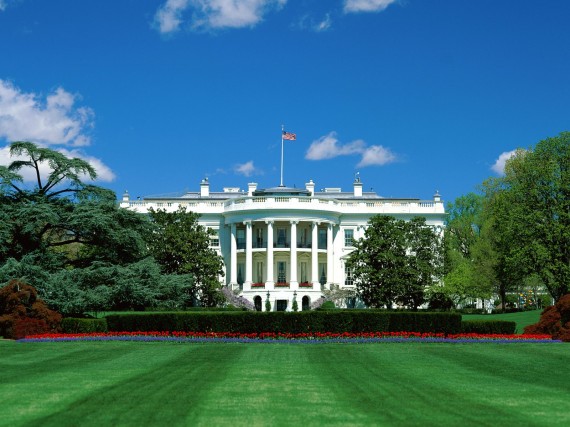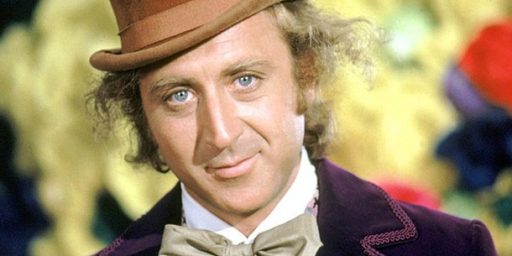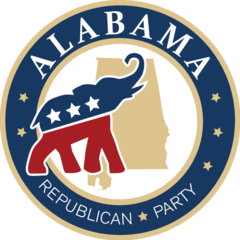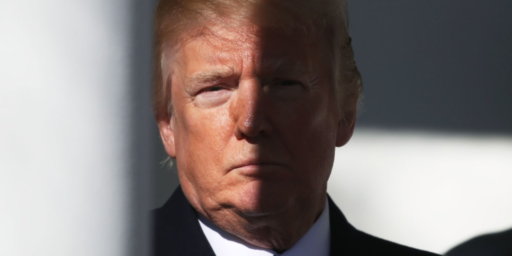Is A Stronger Executive The Cure For What Ails American Government?
David Brooks thinks that the problem with American Government is that the Presidency isn't strong enough.
David Brooks thinks he’s figured out the solution to the perpetual issues of gridlock, Congressional inaction, and a general failure to deal with whatever it might be that he and his fellow residents of the Acela Corridor think are the “important issues.” All we need, he says, is a stronger Executive Branch:
This is a good moment to advocate greater executive branch power because we’ve just seen a monumental example of executive branch incompetence: the botched Obamacare rollout. It’s important to advocate greater executive branch power in a chastened mood. It’s not that the executive branch is trustworthy; it’s just that we’re better off when the presidency is strong than we are when the rentier groups are strong, or when Congress, which is now completely captured by the rentier groups, is strong.
Here are the advantages. First, it is possible to mobilize the executive branch to come to policy conclusion on something like immigration reform. It’s nearly impossible for Congress to lead us to a conclusion about anything. Second, executive branch officials are more sheltered from the interest groups than Congressional officials. Third, executive branch officials usually have more specialized knowledge than staffers on Capitol Hill and longer historical memories. Fourth, Congressional deliberations, to the extent they exist at all, are rooted in rigid political frameworks. Some agencies, especially places like the Office of Management and Budget, are reasonably removed from excessive partisanship. Fifth, executive branch officials, if they were liberated from rigid Congressional strictures, would have more discretion to respond to their screw-ups, like the Obamacare implementation. Finally, the nation can take it out on a president’s party when a president’s laws don’t work. That doesn’t happen in Congressional elections, where most have safe seats.
(…)
We don’t need bigger government. We need more unified authority. Take power away from the rentier groups who dominate the process. Allow people in those authorities to exercise discretion. Find a president who can both rally a majority, and execute a policy process.
Being something of a Hamiltonian by nature, it’s not really that much of a surprise that Brooks would be a fan of a strong Executive. At the same time, though, the nature of his argument here should be disturbing to anyone who still regards the Constitution as something more than just a lovely piece of paper stored at the National Archives.
As has been noted here at OTB many times in the past, we already live in an era where the Presidency has assumed a far greater role in American government than it had an other time in our history. In large part thanks to the Congressional neglect in asserting the authority of the popularly elected branches of government as well as the growth of the regulatory state and the wide discretion given to the Presidency in foreign affairs in the wake of the Cold War and then the War On Terror, American Presidents have become far more powerful than the Founding Fathers ever intended them to be. Gene Healy documented how this came to be in his highly recommended book called The Cult of the Presidency: America’s Dangerous Devotion to Executive Power in which lays out the history of how the Executive Branch has assumed more and more extra-constitutional power throughout American history, usually in response to a crisis, and how the President. Shortly before the 2012 Election, Healy followed up that back with a short examination of how the Obama Administration has built upon the assumptions of power of its predecessors in the both the domestic and foreign policy spheres. That e-book is entitled False Idol: Barack Obama and the Continuing Cult of the President. Healy notes, of course, that President Obama’s expansion upon the power grabs of his predecessors is no historical anomaly but is in fact what has become the norm ever since the so-called “Imperial Presidency” became part of our political system. Each President has built upon the powers that have been asserted by his predecessor in both the domestic and international spheres, and those assertions of power have largely been accepted by a Congress that seems unwilling to assert its own Constitutional authority in a real a significant manner.
This history is, I think, where Brooks’ entire argument falls apart. If the cure for our political problems truly were a stronger Executive, then how does he account for the fact that our political problems have actually increased as the Executive Branch has become more powerful and more authority has become more unified? If his thesis were correct, then the so-called “good government” that he and his fellow Acela traveling compatriots yearn for would would already be here, wouldn’t it? The fact that it clearly isn’t, and that things actually seem to have gotten worse as the Executive has gotten more powerful suggest strongly that this entire thesis is incorrect.
Even if the Brooks thesis were correct, though, and it was possible to that things would run more efficiently if the President didn’t have to rely so much on Congress to get things done, that still wouldn’t justify following the path that he lays out. Under our Constitution, it is the Congress that is supposed to have primary authority over policy matters, over what rules we operate under, and over how money is spent. The more that authority has been ceded, either willingly or not, to the President, the Executive Branch, and the Regulatory Agencies that operate outside the authority of Congress, the further we drift away from the entire idea of a representative democratic republic. I’d also argue that a more powerful Executive is one of the factors that leads, in part, to the gridlock that we see on Capitol Hill. When the authority that Congress has gets ceded more and more to the Executive Branch, the more likely it becomes that Members of Congress will use the power they have left, specifically things like the power of the purse and the Senate’s responsibility to confirm Presidential appointments to the Executive and Judicial Branches, to try to reclaim some of that authority. In a sense then, the dysfunction that Brooks dislikes so much is a direct consequence of the cure that he suggests.
The final point worth noting is that Brooks’ opinion seems to be one that is shared by the people he shares the Op-Ed page of The New York Times with. Thomas Friedman, Maureen Dowd, Gail Collins, and even Ross Douthat all seem to more or less fans of a strong Executive and dismissive of the messiness of the popular branches of government doing what the Constitution created them to do. They are certainly entitled to their opinions, but one would think that the Times would benefit from having someone with an opinion of American government that didn’t wish for an all-powerful Presidency and an weak and compliant Congress, especially since that point of view is completely at odds with what the Constitution established.







The fault lies not with politicians but with voters. A better-educated, better-informed, more sophisticated voting population would not elect extremists who prefer to pander rather than govern. A more sophisticated population would not be watching Fox News and listening to Limbaugh and credulously absorbing their distortions of reality. We have lousy government because we have far too many credulous, mis-informed idiots.
@michael reynolds:
Are you really going to argue that the U.S. would be a better place if most people just automatically voted for the Democratic Party? Given the polling numbers, Democrats are not any better at understanding basic economics than the Republicans. Look at how the left of the Democratic Party is beginning to push for more entitlement spending and making more people totally dependent on the government (See Senators Warren and Brown).
If you want a smarter electroate, at least ask for one that would understand that there is no such thing as a free lunch. MSNBC viewers probably have less of an understanding of that than the Fox News viewers that progressives seem to loathe.
if you start from the POV that the Constitution is a Holy Book created by Founders supernaturally endowed with a wisdom not available to ordinary men, then I can understand why you might think that any departure from the original scheme is wrong a priori. But that is essentially a religious position . George Washington, Thomas Jefferson and Benjamin Franklin did not view themselves as the Father, Son and Holy Ghost or even as divinely inspired seers like Moses or Mohammed. Jefferson himself felt the Constitution need to be rewritten every generation. And indeed it has been substantially rewritten , both by formal amendment and by the Supreme Court
People who appeal to the pristine vision envisaged by the “original” Constitution tend to be appealing to something that they have have created in their minds to make political points.
Did the founders really envisage a weak Presidency? Dunno. George Washington seemed to have no problem moving forcefully to put down the “Whisky Rebellion”. Thomas Jefferson essentially doubled the size of the country almost on his own through the Louisiana Purchase. Andrew Jackson was pretty imperious in his day. Lincoln suspended habeus corpus. And so on. I think the whole weak Presidency, strong Congress scheme as original vision is overblown.
Mean while, over at the National Journal, they have argued that the original constitutional scheme is outmoded and that we need to “blow up the Constitution.”
I would argue, along with the National Journal, that’s what’s needed is not a stronger executive, but a move to a European style parliamentary system. That seems to be what works. And I like to go with what works, not appeal to some vision of a “Golden Age” that never was.
@superdestroyer:
I’ve seen no evidence that Republicans understand economics any better than Democrats. Laffer Curve anyone? Trickle down? Cut government in the middle of a recession? Cut taxes while conducting an unfunded war? A war that would pay for itself?
Of course in my opinion economists don’t understand the economy either. But we could all spend more time contemplating that if we were not constantly mired in birth certificate snipe hunts, wars on Christmas, efforts to stop non-existent voter fraud, and the entire, endless parade of absurd gay-bashing, immigrant-scapegoating, race-baiting bullsh!t that occupies the voter’s attention.
No, I don’t want everyone to vote either one way or the other. I want voters to understand their constitution, their government, at least a little bit about the wider world, possess some modicum of compassion and morality, and to have a clear idea of their own interests.
@stonetools:
Yep. This is a very religious country, unlike most of Europe or Japan, and we endlessly conflate the Bible and the Constitution. People conditioned to believe in gods and devils tend to apply that template to everything around them.
I would add that the notion of the states is absurd on its face. The 2d amendment costs us tens of thousands of lives. The 1st amendment, though about as clearly written as can be, nevertheless is chewed at by government. There’s no acknowledgment of the power and reach of corporations.
The list of problems goes on and on. The US constitution started out with slavery and male-only suffrage. You have to be pretty dumb to imagine it was divinely-inspired, but that brings me back to my point: voters are pretty dumb.
@stonetools:
Exactly, many treat it as a religious document but most of them cherry pick it just like they do the Bible. I agree that the Constitution should simply be thrown out and we should start from scratch. That simply isn’t going to happen though.
@Ron Beasley:
Do you really think Americans are going to trust each other enough to rewrite the constitution. As it goes now, the courts have found ways around virtually everything in the Constitution that is not a hard number. Do you really think that Americans couild every agree on anything enough to rewrite the constitution.
What the U.S. really needs is a Congress that takes its job of budgeting, over-site, and passing law seriously. One of the major issues that the government has are vague laws passed by Congress with the expectation that the Executive Branch will propagate regulations to fix all of the problems. What eveyrone also needs are Congressman to have better staffs and hire competent people instead of a long list of the children and associates of donors.
@superdestroyer: Michael Reynolds didn’t say anything remotely like everybody should vote Democratic. If you leap to the conclusion that a “better educated, better-informed, more sophisticated voting population” would automatically vote Dem, well, you’re probably right. But that’s not Michael’s fault.
And yes, our current situation would be better if we had elected more Democrats. The real moral of this story is that David Brooks knows that. He also knows that the money poured into politics is the real underlying problem; which he admits when he talks about the executive branch being more sheltered from interest groups. But since he’s a dedicated Republican masquerading as a centrist, he can’t say those things. So he has to wander off into some phantasy about a stronger presidency.
I hate to be caught agreeing with the likes of Brooks and Dowd, but it seems to me that they are reacting to the world as it is — with the congress crippled by a small number of psychotics, delusionals and truly evil people — while JJ pines for a pure vision of the perfect government as he imagines it was carved into granite a couple hundred years ago.
The respect and attempt to follow the constitution is appropriate. To festishize it as some kind of bible is nuts.
@michael reynolds:
I think the problem is not just education, but that there really is a blue America and a red America and they have fundamentally different visions of America. Doug for example is highly educated but he doesn’t want the government in the business of providing universal health insurance to its citizens. I think this position is wrong-politically and even morally wrong-but it’s not an uneducated one.
Now what has resulted in gridlock is the Big Sort-Conservatives are all in the Republican Party and liberals are all in the Democratic Party. this means that the era of building bi-partisan coalitions on the big issues is dead and gone forever. It also means that if the minority party can block the majority party, it well-and unfortunately, they have lots of ways to do that and every reason politically to do so.
There are ways out of the current impasse. But trying to go back to 1787 (or what you think 1787 was) isn’t one of them
I’d say that our current, addled Congress is at fault – but after reading Twain’s purple prose description of Congress past, maybe the current foolishness isn’t an anomaly.
However, they seem downright eager to cede their institutional power to the courts and the executive. This, more than anything, is where Mr Madison’s elegant plan has gone awry.
I’ll also add that, since Reagan, we’ve decided as a nation to scorn community in favor of selfishness (laughingly referred to as “individualism”). We do not value what cannot be instantly monetized. This is as dangerous to a Republic – which requires a great deal of effort to maintain – as an idiotic Congress or an obsequious Fourth Estate.
And here’s a prime example of that…
Ratifying the Constitution was an extremely controversial decision. And no sooner was the Constitution established and the government it defined put in place than it’s limitations became apparent. One way of looking at US history is to think of it as the sequence of ‘work-arounds’ that we’ve had to come up with over the years because the founding document had either no guidance or the wrong kind.
It would be better to inshrine the ideals of the Founders without strapping ourselves to their attempt to enact them, I think. And one of their really bad ideas turned out to have been Congressional dominance over the Executive. They imagined that the enemy of liberty would be the strong central government. They thought the strongest bulwark defending liberty would be the state governments. It took until the 1870s with the passage of the 14th Amendment to extend the Bill of Rights guarantees to the individual citizens because up until then laws passed by states did not have to meet the Bill of Rights standard. Several states had ‘Established’ churches, for example.
And really, just from a practical point of view, does anyone think 535 feuding individuals divided into parties, factions and separate legislative bodies are likely to produce better policies than a competent Executive branch? Is anyone that stupid? Oh wait…..
This is purely speculative, but is it possible that a strong executive/figurehead or weak congress is inevitable? I’m trying to think of a historical example of an active “superpower” that started with some sort of “parliamentary” form of government did not eventually go to strong executive to maintain/expand their empire (the Roman Empire and Napoleonic France, perhaps a few other examples that don’t match us as closely.) The only counter-example I can really think of a weakened executive giving over to a strengthening parliament, the British Empire, also basically lost most pretensions of empire over time as well. We definitely seem to be seeing a rise the factionalism and dysfunction that marked the beginning of the ends of the Republic phases of both France and Rome and eventually allowed an executive to seize power. Perhaps someone more well versed in history than myself can consider that.
It is not something I find desirable, but I think the pressure that is placed on our political leadership and our role on the international stage may inherently demand that the government be more flexible and responsive than congress can ever be and much of what we are seeing now is simply our government overwhelmed by issues it can’t really deal with but can’t avoid.
Minus some outside unifying condition I only see more of the same for the foreseeable future, congress frozen and the executive and, to a lesser extent, judiciary branches seizing more power because they have to.
@superdestroyer: No I don’t which is why I said it’s not going to happen.
@JohnMcC:
Depends entirely on who the Chief Executive is.
@michael reynolds
I have some quite well educated friends (albeit narrowly educated) who are amazingly ignorant. I’ve said for years that politics in this country would be completely different if the average middle-aged, middle-class guy took half the time he spends on sports news and spent it on current events and history. Even a quarter. Maybe we could require news broadcasts at half-time and move editorials to the sports section.
Not that I would engage in such disparaging remarks about Citizens. At least not today yet.
Oh, why not.
Who is worse? The mis-informed idiots or the do-gooders who want to force all those idiots to vote in all elections or be punished?
How will this be administered? Will the Federal Government have to regulate the content of the Network Sports 1/2 time shows?
Maybe you can be the Government Approved News Producer for the NFL Network.
Greetings:
Perhaps instead of one of Candy Crowley’s over-protective debates, we could have presidential candidates throw out some “first pitches” to see who’s stronger ???
@11B40: Just had to Google Candy Crowley. Never heard of her before.
———-
This will for sure make all ten of you out there who still read a paper rag think more about Civic Affairs than the Brutal Spectacles you prefer. And you WILL be the better for it!
I wonder if it ever occurs to the Libertarians who strive to perpetuate a cynical attitude, even paranoia, about the US government that they may be creating the very condition of chaos which has caused people, throughout the history of democracy, to abandon it. At a certain point, people simply want order. We are electing too many demagogues, panderers to public sentiment.
When we constantly, reflexively, and even very unfairly denigrate our politicians, that’s what you get. Brooks might have a point, but if he does, we are to blame.
Right. If we all just follow the government blindly without thinking for ourselves, politics, and the world in general, would be a much better place.
I figure at this point when somebody waxes poetic about a stronger Presidency, what they actually want is a parliamentary system. Which isn’t crazy at all, but b/c of American Exceptionalism we can’t talk about that. 😉